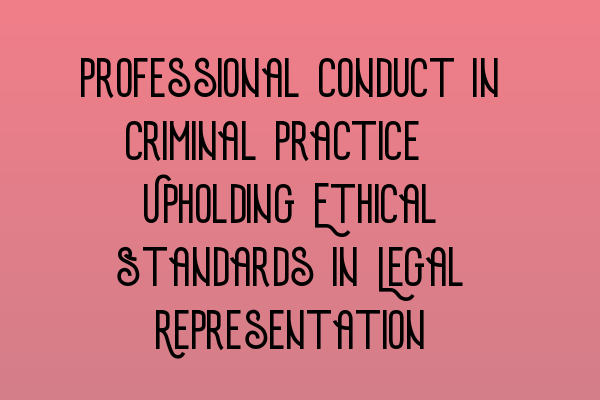Professional Conduct in Criminal Practice: Upholding Ethical Standards in Legal Representation
As legal professionals, it is our responsibility to provide the highest level of representation for our clients while maintaining ethical standards. In the field of criminal law, this duty becomes even more crucial, as the freedom and rights of individuals are at stake. In this blog post, we will explore the importance of professional conduct in criminal practice and discuss how it contributes to upholding ethical standards in legal representation.
Understanding Professional Conduct
Professional conduct refers to the behavior and actions of legal professionals in their practice. It encompasses the ethical obligations, responsibilities, and standards that guide their interactions with clients, colleagues, and the justice system as a whole. In criminal law, professional conduct holds paramount importance as it ensures fair and just proceedings.
Client-Centered Approach
One of the fundamental aspects of professional conduct in criminal practice is the client-centered approach. This approach emphasizes treating clients with respect, empathy, and confidentiality. Legal professionals must develop a strong attorney-client relationship based on trust and effective communication.
By understanding and addressing the unique needs and concerns of clients, legal representatives can provide a more tailored and effective defense strategy. This approach not only instills confidence in clients but also contributes to a fair and just legal system.
Conflicts of Interest
Another critical aspect of professional conduct is avoiding conflicts of interest. Legal professionals must ensure that their personal interests or relationships do not compromise their ability to represent their clients effectively. This includes refraining from representing conflicting parties or situations where there is a potential threat to the attorney-client privilege.
To maintain ethical standards, legal representatives must fully disclose any potential conflicts of interest to their clients and seek their informed consent before proceeding. By doing so, they uphold their duty of loyalty to their clients and demonstrate transparency in their practice.
Competence and Continuing Professional Development
A key component of professional conduct in criminal practice is maintaining the highest level of competence. Legal professionals need to have a deep understanding of criminal law, procedural rules, and courtroom advocacy techniques. Moreover, they should stay updated with changes in legislation, case law, and legal developments.
SQE 1 Practice Mocks FLK1 FLK2
Continuing professional development (CPD) plays a vital role in staying competent and up-to-date in criminal practice. Lawyers should actively engage in CPD courses, workshops, and seminars to enhance their knowledge and skills. Additionally, pursuing specialist qualifications, such as the Solicitors Qualifying Examination (SQE), can demonstrate a commitment to professional growth and development.
Ethical Obligations to the Court
Legal professionals have an ethical duty towards the court. They must uphold the integrity of the justice system by presenting honest, truthful, and reliable evidence. Lawyers should refrain from engaging in misleading or deceptive practices that may undermine the administration of justice.
Furthermore, legal representatives should cooperate with the court and adhere to procedural rules and court etiquette. They should conduct themselves with professionalism and respect, promoting a positive image of the legal profession.
Conclusion
Professional conduct in criminal practice is essential for upholding ethical standards in legal representation. By adopting a client-centered approach, avoiding conflicts of interest, maintaining competence, and fulfilling ethical obligations towards the court, legal professionals contribute to a fair and just criminal justice system.
At SQE Criminal Law & Practice Law UK, we understand the significance of professional conduct in criminal practice. Our comprehensive SQE 1 Preparation Courses and SQE 2 Preparation Courses equip aspiring legal professionals with the knowledge and skills needed to excel in their careers.
Stay up to date with the latest SRA SQE exam dates: SRA SQE Exam Dates.
